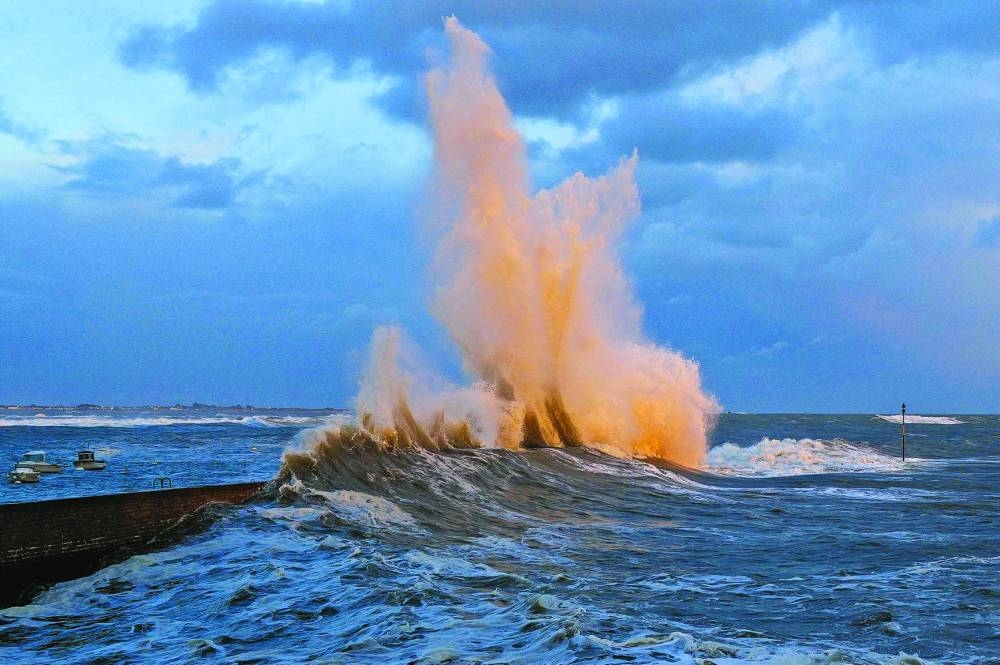Seven people were killed as Storm Ciaran battered Western Europe yesterday, bringing record winds as high as 200kph, floods, blackouts and major travel disruptions.
Storm Ciaran, which follows on the heels of Storm Babet two weeks ago, was driven by a powerful jet stream that swept in from the Atlantic, unleashing heavy rain and furious winds that have already caused heavy flooding in Northern Ireland and parts of Britain.
Some 1.2mn French homes lost electricity overnight as the storm lashed the northwest coast, and most remained without power yesterday.
In the Belgian city of Ghent a five-year-old child was killed by falling branches while playing outside.
Also in Ghent, a falling branch killed a 64-year-old woman walking in the city’s Citadel Park with her husband and daughter who was seriously injured.
Falling trees had earlier killed a lorry driver in his vehicle in France’s Aisne region, and French authorities also reported the death of a man who fell from his balcony in the port city of Le Havre.
A man in the Dutch town of Venray, a woman in central Madrid, and a person in Germany also died.
“The wind gusts are exceptional in Brittany and many absolute records have been broken,” Meteo-France, the national weather service, said on X (formerly Twitter).
The prefect for the local department said gusts as high as 207kph (129mph) were recorded at Pointe du Raz on the tip of the northwest coast, while the port city of Brest saw winds hit 156kph.
In southern England, hundreds of schools were closed as large waves powered by winds of 135kph crashed along the coastline.
On the Channel Island of Jersey, residents had to be evacuated to hotels overnight as gusts of up to 164kph damaged homes.
More than 200 flights were cancelled at Amsterdam’s Schiphol Airport, a major European hub.
Air, rail and ferry services saw cancellations and long delays across several countries.
“Due to a warm autumn with a lot of rain, trees still have their leaves, and the ground is as wet as a sponge,” said Roosmarijn Knol, weather forecaster for Dutch public broadcaster NOS. “Therefore, especially weak trees have a good chance of falling over. That is a big difference from an autumn storm at, say, the end of November, when all the leaves have already fallen.”
Britain’s Environment Agency warned of “significant flooding along parts of the south coast and along parts of the Yorkshire and Northeast coasts”.
The effects of the storm were felt as far south as Spain and Portugal, with Spanish authorities warning of waves as high as 9m along the Atlantic coast.
In France’s northern Pas-de-Calais, authorities opened gymnasiums and shelters for migrants who converge on the region hoping to make it to Britain by boat.
However, despite some damaged buildings and cars, there was some relief in France.
“We were expecting worse. There was obviously a big blast of wind, but no major damage,” said one local mayor, Olivier Lepick.
There was disappointment, however, for the hardy athletes of the annual Dutch “headwind cycle championships” race.
They only hold their race along the Oosterscheldekering storm surge barrier in the western Netherlands if the wind is above a gale seven on the Beaufort Scale (up to 61kph), but they finally met their match with Storm Ciaran and had to postpone it.
There were “many disappointed faces”, organiser Robrecht Stoekenbroek told local agency ANP.
The French weather service said storms would continue into today, notably in the southwest of the country and on the island of Corsica with heavy rainfall expected.

A wave crashes on a dyke in Lomener, western France, as Storm Ciaran hits Western Europe.
